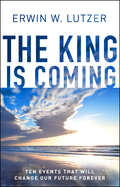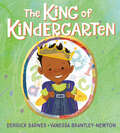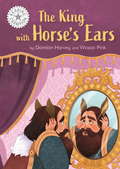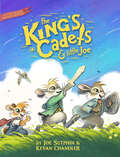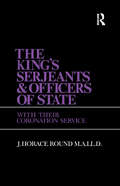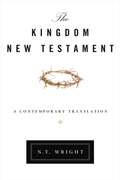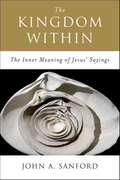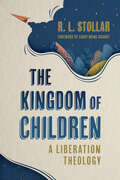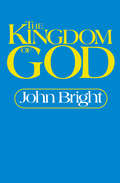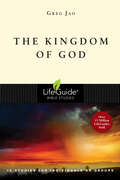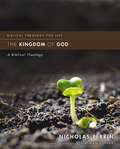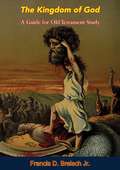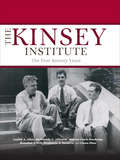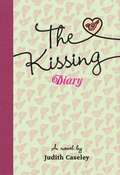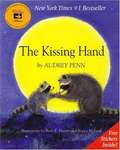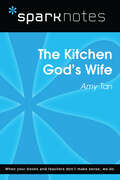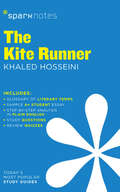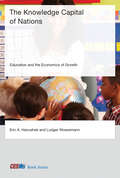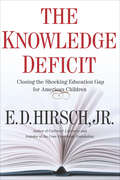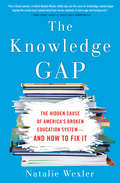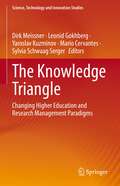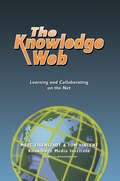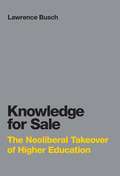- Table View
- List View
The King is Coming: Ten Events That Will Change Our Future Forever
by Erwin W. LutzerBegin to explore the end.The end is near. While these often sound like words of insane rambling, they can also be a sensible presentation of truth. Acknowledging that what is yet to come is beyond the scope of our wildest projections, pastor and scholar Erwin Lutzer reminds us that we have not been left completely in the dark. There is much we can know.Within this book are ten events we can be certain of, ten events that will change our future forever. You will be encouraged to renew your expectation of the return of the Messiah and, in so doing, be motivated to live pure lives for Him.The King is Coming has been written precisely to aid your own exploration of biblical prophecies with sound, sensible, balanced perspectives based on the simple meaning of the biblical texts. Saturated with both humility and a sense of urgency, this book not only provides answers for those questioning what comes next, but also empowerment and instruction to live accordingly in the here and now.
The King of Kindergarten
by Derrick BarnesA New York Times bestseller!A confident little boy takes pride in his first day of kindergarten, by the Newbery Honor-winning author of Crown.The morning sun blares through your window like a million brass trumpets.It sits and shines behind your head--like a crown. Mommy says that today, you are going to be the King of Kindergarten!Starting kindergarten is a big milestone--and the hero of this story is ready to make his mark! He's dressed himself, eaten a pile of pancakes, and can't wait to be part of a whole new kingdom of kids. The day will be jam-packed, but he's up to the challenge, taking new experiences in stride with his infectious enthusiasm! And afterward, he can't wait to tell his proud parents all about his achievements--and then wake up to start another day. Newbery Honor-winning author Derrick Barnes's empowering story will give new kindergarteners a reassuring confidence boost, and Vanessa Brantley-Newton's illustrations exude joy.
The King with Horse's Ears: Independent Reading White 10 (Reading Champion #540)
by Damian HarveyA kind king in a far off land has been hiding his ears from everyone in his kingdom - even his wife, the queen! He has horse's ears on his head and he is afraid everyone will laugh if they find out... Until a magical violin changes everything! For Independent Reading at White Band 10, readers aged 5-7 years.This story is part of Reading Champion, a series carefully linked to book bands to encourage independent reading skills, developed with Dr Sue Bodman and Glen Franklin of UCL Institute of Education (IOE).Reading Champion offers independent reading books for children to practise and reinforce their developing reading skills.Fantastic, original stories are accompanied by engaging artwork and a reading activity. Each book has been carefully graded so that it can be matched to a child's reading ability, encouraging reading for pleasure.
The King's Cadets and Little Joe: A Little Pilgrim's Progress Adventure
by Joe Sutphin Kevan ChandlerNewly imagined tales from the world of Little Pilgrim now for early readers!The King&’s Cadets and Little Joe is a collection of five short stories following the characters from the land of Little Pilgrim. Early readers will be absorbed in the delightful tales and captivated by the enchanting woodland illustrations as they adventure with three brothers, Matthew, James, and Little Joe. The rabbits spend their days playing in the fields and woods of the Land of Delight and dream of growing up to one day be soldiers of the King, like their hero, Great Heart. Wielding wooden swords and shields, they call themselves the King&’s Cadets. These knights in training, including the littlest brother who&’s confident he&’s big enough to join, set out on courageous missions of their own. Their bravery and boldness get them into trouble from time to time, and they occasionally need a little direction from their wise woodland friends.Readers will return to the adventures and misadventures of The King&’s Cadets and Little Joe again and again.
The King's Serjeants & Officers of State: Kings & Sergeants
by J. Horace RoundFirst published in 1971. Routledge is an imprint of Taylor & Francis, an informa company.
The Kingdom New Testament: A Contemporary Translation
by N. T. WrightThe New Testament for the Twenty-First Century. Most readers of the New Testament have grown overly familiar with the biblical text, losing sight of the wonder and breadth of its innovative ideas and world-changing teachings about the life and role of Jesus of Nazareth. N. T. Wright invigorates these sacred texts with an all-new English translation that allows contemporary readers to encounter these historic works afresh. With the insight and expertise of "the world's leading New Testament scholar" (Newsweek), this approachable, engaging translation features accessible, modern prose that stays true to the character of the ancient Greek text by maintaining the vibrancy and vigor of the original works while also conveying the most accurate rendering possible. The Kingdom New Testament will help the next generation of Christians acquire a firsthand understanding of what the New Testament had to say in its own world, and what it urgently has to say in ours.
The Kingdom Within: The Inner Meanings of Jesus' Sayings
by John A. SanfordA psychoanalyst and episcopal priest presents a Jungian understanding of Christ’s teaching in this revised edition of a spiritual classic.By showing how Jesus’ teachings relate to our inner depths, The Kingdom Within guides us toward a more conscious and creative life. John A. Sanford explores the significance of Jesus’ teachings for our interior life—that inner reality that Jesus called “the kingdom of God.” It is Sanford’s conviction that contemporary Christianity has overlooked this inner dimension of Jesus’ teachings and so has lost touch with the human soul.Illustrated with case histories and dream material drawn from the author’s work as a psychotherapist, The Kingdom Within examines such characteristics as extroversion and introversion, masculinity and femininity, thinking and feeling, and sensation and intuition to show how Jesus met the criteria of wholeness or fullness of personhood. Step by step, Sanford helps us to shed the outer mask, to eschew sin, which “means living in enslavement to what we don’t know about ourselves,” and to follow the road of consciousness, which leads to “a great treasure waiting only to be discovered.”
The Kingdom of Children: A Liberation Theology
by R. L. StollarEmpower the children in your faith community. Children are marginalized in our churches, dismissed into Sunday school or silenced for lengthy sermons aimed at adults. R. L. Stollar has spent his career advocating for the rights of children, and he thinks it&’s time to stop talking down to children and start listening to them.In The Kingdom of Children, Stollar proposes a liberation theology of the child. Stollar begins with a theoretical framework that centers children in our theology and ecclesial life. Reframing biblical stories to center children, we can see how the binding of Isaac reflects the spiritual effects of child abuse, or how children like Miriam can serve as leaders in their communities. Using scriptural examples as well as real studies of children&’s spiritual lives, Stollar asserts that children can be priests, prophets, and theologians in our communities. Each chapter concludes with activities and discussion points for introducing the book&’s concepts to children.The Kingdom of Children is a must-read for youth ministers, parents, and anyone who works with children. By embracing the liberation of children, we can avoid stunting their spiritual growth and passing on trauma. And when we lift up children—truly value and learn from them—we build up the kingdom of God here in our communities.
The Kingdom of God
by John BrightThis book traces the history of the biblical idea of the Kingdom of God and suggests its contemporary relevance. “To grasp what is meant by the Kingdom of God is to come very close to the heart of the Bible’s gospel of salvation.”—from the Preface
The Kingdom of God (LifeGuide Bible Studies)
by Greg Jao®PDF download with a single-user license; available from InterVarsity Press and other resellers.
The Kingdom of God: A Biblical Theology (Biblical Theology for Life)
by Nicholas PerrinIn the last hundred and fifty years the kingdom of God has emerged as one of the most important topics in theology, New Testament studies, and the life of the church. But what exactly is the kingdom of God? What does it mean for the people of God and what does it mean for how they live in the world?In The Kingdom of God, part of the Biblical Theology for Life series, Nicholas Perrin explores this dominant biblical metaphor, one that is paradoxically the meta-center and the mystery in Jesus' proclamation. After survey interpretations by figures from Ritschl to N. T. Wright, Perrin examines the "what, who, and how" questions of the kingdom. In his sweepingly comprehensive study, Perrin contends that the kingdom is inaugurated in Jesus' earthly ministry, but its final development awaits later events in history. In between the times, however, the people of God are called to participate in the reign of God by living out the distinctly kingdom-ethic through hope, forgiveness, love, and prayer.X
The Kingdom of God: A Guide for Old Testament Study
by Francis BreischIn The Kingdom of God, which was first published in 1959, author Francis D. Breisch Jr. himself perfectly summarizes the message of the Old Testament: “It exhibits the unity which exists in the Old Testament. It shows the historical development of God’s work of redemption. It emphasizes the fact that the entire Old Testament prepares for the coming of Christ, the eternal King. To trace the growth of the Kingdom of God is to keep one’s finger on the pulse of God’s redemptive program. Throughout the guide I have attempted to point out the various ways in which the Kingdom of God comes to expression in the Old Testament.”In his own words, Francis D. Breisch Jr.’s book is geared towards the high school student—“reflected in both form and content”—but readers of all ages will find this volume extremely informative in its expression of the way in which God’s kingdom developed over the centuries.
The Kinsey Institute: The First Seventy Years (Well House Bks.)
by Judith A. Allen Andrew Clark-Huckstep Brandon J. Hill Hallimeda E. Allinson Liana Zhou Stephanie A. SandersAn in-depth history of Alfred Kinsey&’s groundbreaking Institute for Sex Research and the cultural awakening it inspired in America—&“it has no rival&” (Angus McLaren). While teaching a course on Marriage and Family at Indiana University, biologist Alfred Kinsey noticed a surprising dearth of scientific literature on human sexuality. He immediately began conducting his own research into this important yet neglected field of inquiry, and in 1947, founded the Institute for Sex Research as a firewall against those who opposed his work on moral grounds. His frank and dispassionate research shocked America with the hidden truths of our own sex lives, and his two groundbreaking reports —Sexual Behavior in the Human Male (1948) and Sexual Behavior in the Human Female (1953)—both became New York Times bestsellers. In The Kinsey Institute: The First Seventy Years, Judith A. Allen and her coauthors provide an in-depth history of Kinsey&’s groundbreaking work and explore how the Institute has continued to make an impact on our culture. Covering the early years of the Institute through the &“Sexual Revolution,&” into the AIDS pandemic of the Reagan era, and on into the &“internet hook-up&” culture of today, the book illuminates the Institute&’s enduring importance to society.
The Kissing Diary
by Judith Caseley[from inside flaps] "Twelve-year-old Rosie is a never-been-kissed, hopeless romantic. Her mother has a new boyfriend. So why can't Rosie attract the attentions of the cutest boy in the seventh grade, Robbie Romano? Is it because she's two inches taller than he is? Is it her horrible name? Or is she simply a dork? If only she could be more like her rival, the perfect and popular Mary Katz, then maybe Robbie would notice her. As Rosie navigates the ups and downs of adolescence, she eagerly anticipates the experience of a first kiss... when she's not completely grossed out at the thought of it. But by the time the big dance rolls around, Rosie manages to surprise herself, in more ways than one. Judith Caseley's perceptive and funny story captures the bitterness and euphoria of growing up, the messiness of having a crush, and how sometimes the most unexpected things in life are the most enjoyable. Judith Caseley is the author of many popular books for young readers, including Losing Louisa. She lives in Glen Head, New York."
The Kissing Disaster (The Fabulous Five #7)
by Betsy HaynesCAN MELANIE WIN FRIENDS WITH KISSES? Jana Morgan, Melanie Edwards, Beth Barry, Christie Winchell, Katie Shannon ... they're The Fabulous Five. They started out as a club whose secret purpose was to keep up with snobby Taffy Sinclair. Now these five best friends are in the seventh grade--are they ready for the ups and downs of junior high? THE KISSING DISASTER When the other members of The Fabulous Five seem too busy to have time for her, Melanie starts feeling left out. To get attention, she decides to prove how popular she is, and she manages to get two of the cutest boys in the seventh grade to kiss her. Word spreads like wildfire. Laura McCall, her rival, couldn't be more jealous, and Melanie couldn't be happier--until disaster strikes. Now, instead of being popular, no one at school will go near her! Will Melanie ever have friends again?
The Kissing Hand
by Audrey Penn Ruth E. Harper Nancy M. Leak<p>School is starting in the forest, but Chester Raccoon does not want to go. To help ease Chester's fears, Mrs. Raccoon shares a family secret called the Kissing Hand to give him the reassurance of her love any time his world feels a little scary. <p>Since its first publication in 1993, this heartwarming book has become a children's classic that has touched the lives of millions of children and their parents, especially at times of separation, whether starting school, entering daycare, or going to camp. It is widely used by kindergarten teachers on the first day of school. Stickers at the back will help children and their parents keep their Kissing Hand alive.</p>
The Kissing Hand (Into Reading, Trade Book #8)
by Audrey Penn Ruth Harper Nancy LeakNIMAC-sourced textbook
The Kitchen God's Wife (SparkNotes Literature Guide Series)
by SparkNotesThe Kitchen God's Wife (SparkNotes Literature Guide) by Amy Tan Making the reading experience fun! Created by Harvard students for students everywhere, SparkNotes is a new breed of study guide: smarter, better, faster. Geared to what today's students need to know, SparkNotes provides: *Chapter-by-chapter analysis *Explanations of key themes, motifs, and symbols *A review quiz and essay topicsLively and accessible, these guides are perfect for late-night studying and writing papers
The Kite Runner (SparkNotes Literature Guide Series #40)
by SparkNotesThe Kite Runner (SparkNotes Literature Guide) by Khaled Hosseini Making the reading experience fun! When a paper is due, and dreaded exams loom, here's the lit-crit help students need to succeed! SparkNotes Literature Guides make studying smarter, better, and faster. They provide chapter-by-chapter analysis; explanations of key themes, motifs, and symbols; a review quiz; and essay topics. Lively and accessible, SparkNotes is perfect for late-night studying and paper writing. Includes:An A+ Essay—an actual literary essay written about the Spark-ed book—to show students how a paper should be written.16 pages devoted to writing a literary essay including: a glossary of literary termsStep-by-step tutoring on how to write a literary essayA feature on how not to plagiarize
The Knowledge Capital of Nations: Education and the Economics of Growth (CESifo Book Series)
by Ludger Woessmann Eric A. HanushekA rigorous, pathbreaking analysis demonstrating that a country's prosperity is directly related in the long run to the skills of its population.In this book Eric Hanushek and Ludger Woessmann make a simple, central claim, developed with rigorous theoretical and empirical support: knowledge is the key to a country's development. Of course, every country acknowledges the importance of developing human capital, but Hanushek and Woessmann argue that message has become distorted, with politicians and researchers concentrating not on valued skills but on proxies for them. The common focus is on school attainment, although time in school provides a very misleading picture of how skills enter into development. Hanushek and Woessmann contend that the cognitive skills of the population—which they term the “knowledge capital” of a nation—are essential to long-run prosperity. Hanushek and Woessmann subject their hypotheses about the relationship between cognitive skills (as consistently measured by international student assessments) and economic growth to a series of tests, including alternate specifications, different subsets of countries, and econometric analysis of causal interpretations. They find that their main results are remarkably robust, and equally applicable to developing and developed countries. They demonstrate, for example, that the “Latin American growth puzzle” and the “East Asian miracle” can be explained by these regions' knowledge capital. Turning to the policy implications of their argument, they call for an education system that develops effective accountability, promotes choice and competition, and provides direct rewards for good performance.
The Knowledge Deficit: Closing the Shocking Education Gap for American Children
by E. D. HirschThe Knowledge Deficit illuminates the real issue in education today -- without an effective curriculum, American students are losing the global education race. In this persuasive book, the esteemed education critic, activist, and best-selling author E.D. Hirsch, Jr., shows that although schools are teaching the mechanics of reading, they fail to convey the knowledge needed for the more complex and essential skill of reading comprehension. Hirsch corrects popular misconceptions about hot issues in education, such as standardized testing, and takes to task educators' claims that they are powerless to overcome class differences. Ultimately, this essential book gives parents and teachers specific tools for enhancing children's abilities to fully understand what they read.
The Knowledge Gap: The hidden cause of America's broken education system--and how to fix it
by Natalie WexlerThe untold story of the root cause of America's education crisis--and the seemingly endless cycle of multigenerational poverty.It was only after years within the education reform movement that Natalie Wexler stumbled across a hidden explanation for our country's frustrating lack of progress when it comes to providing every child with a quality education. The problem wasn't one of the usual scapegoats: lazy teachers, shoddy facilities, lack of accountability. It was something no one was talking about: the elementary school curriculum's intense focus on decontextualized reading comprehension "skills" at the expense of actual knowledge. In the tradition of Dale Russakoff's The Prize and Dana Goldstein's The Teacher Wars, Wexler brings together history, research, and compelling characters to pull back the curtain on this fundamental flaw in our education system--one that fellow reformers, journalists, and policymakers have long overlooked, and of which the general public, including many parents, remains unaware. But The Knowledge Gap isn't just a story of what schools have gotten so wrong--it also follows innovative educators who are in the process of shedding their deeply ingrained habits, and describes the rewards that have come along: students who are not only excited to learn but are also acquiring the knowledge and vocabulary that will enable them to succeed. If we truly want to fix our education system and unlock the potential of our neediest children, we have no choice but to pay attention.
The Knowledge Triangle: Changing Higher Education and Research Management Paradigms (Science, Technology and Innovation Studies)
by Leonid Gokhberg Dirk Meissner Yaroslav Kuzminov Mario Cervantes Sylvia Schwaag SergerThis book helps readers understand how universities position themselves in the innovation landscape and the implications for national policies. It provides a scholarly discussion and best practice–based insights to help answer questions like: To what extent do funding and governance policies support activities within the knowledge triangle? How should policies for universities be designed in countries with different industrial and higher education structures? Are there ways to effectively link universities with regional enterprises and social actors? And finally, what are the new institutional models and best practices for overcoming obstacles to interaction, collaboration, and co-creation?
The Knowledge Web: Learning and Collaborating on the Net (Open and Flexible Learning Series)
by Eisenstadt, Marc Vincent, TomFeaturing contributions from staff and associates of the Knowledge Media Institute at the UK Open University, this text provides a glimpse into the wide variety of projects undertaken in the development and assessment of distance learning technologies.
The Knowledge for Sale: The Neoliberal Takeover of Higher Education
by Lawrence BuschA new philosophy of higher education has taken hold in institutions around the world. Its supporters disavow the pursuit of knowledge for its own sake and argue that the only knowledge worth pursuing is that with more or less immediate market value. Every other kind of learning is downgraded, its budget cut. In Knowledge for Sale, Lawrence Busch challenges this market-driven approach.The rationale for the current thinking, Busch explains, comes from neoliberal economics, which calls for reorganizing society around the needs of the market. The market-influenced changes to higher education include shifting the cost of education from the state to the individual, turning education from a public good to a private good subject to consumer demand; redefining higher education as a search for the highest-paying job; and turning scholarly research into a competition based on metrics including number of citations and value of grants. Students, administrators, and scholars have begun to think of themselves as economic actors rather than seekers of knowledge.Arguing for active resistance to this takeover, Busch urges us to burst the neoliberal bubble, to imagine a future not dictated by the market, a future in which there is a more educated citizenry and in which the old dichotomies -- market and state, nature and culture, and equality and liberty -- break down. In this future, universities value learning and not training, scholarship grapples with society's most pressing problems rather than quick fixes for corporate interests, and democracy is enriched by its educated and engaged citizens.
